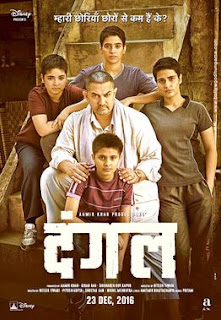Why Biopics Are THE Thing Of Today #BOLLYGUPSHUP
 |
| Source: Wikipedia |
Bhaag Milkha Bhaag, the biopic on the life of the renowned athlete Milkha Singh, lovingly known as ‘The Flying Sikh’ went on to earn 100 crores. Paan Singh Tomar, the story of an athlete turned rebel, went on to win the Best Feature Film in the 60th National Film Awards. Mary Kom, the journey of a boxer to win the 2008 World Boxing Championship, won the title of The Best Popular Film Providing Wholesome Entertainment at the 62nd National Film Awards. Shahid, the movie based on the life of lawyer and human rights activist Shahid Azmi who was assassinated in 2010 in Mumbai, went on to win the National Film Award For Best Actor and Best Director at the 61st National Film Awards. Dirty Picture, the biopic on the controversy-courting South Indian actress Silk Smitha garnered applauds from the audience and critics alike. Dangal, the biographical sports drama that portrays the role of Mahavir Singh Phogat who teaches his two daughters Babita Kumari and Geeta Phogat wrestling, who become India’s first female wrestlers to win the Commonwealth Games, is the second-highest grossing Indian film today, after Bahubali. This is the golden era for biographical tales in Indian Cinema.
People draw inspiration from those around them, from the strangers they encounter in day to day life, from the unusual success stories that they read in the newspaper, from the Bollywood stars through their lives as showcased in media, and from the fictional characters depicted in movies. Since cinema is the medium almost everyone is acquainted with and seeks emotional solace from, it’s the best one to elucidate on lives of famous personalities, their struggle, and strife before success graced them.
Every hugely successful person has one flaw that we don't know about. That vulnerability when exposed gives us the much-needed motivation to dream ahead in life, and achieve all our goals; it boosts our confidence and keeps us from wallowing in self-pity. People talking about their lows when they are at the pinnacle of success connects them with the common folk, it makes things feel real and achievable. They have been rubbed hard in the past and thus are polished to shine brightly now. Hardships and flaws are shared these days without hesitation.
Biopics are also made on the unsung heroes of the society, who make news for a few days and are then easily forgotten. Manjhi: The Mountain Man, Neerja, Sarbjit, Azhar, Raes, and Aligarh have received the love of the multiplex generation, acclaim of movie connoisseurs and praise from the critics. M.S.Dhoni: The Untold Story essays the life of the Indian Cricketer Mahendra Singh Dhoni- the hurdles he faced in the realization of his dreams as a cricketer and life as the Indian team captain. Budhiya Singh: born to run- A child from Odisha who becomes the world’s youngest marathon runner at the age of four.
 |
| Source: Amazon.in |
So biopics are the thing of today- the level of acceptance and appreciation the public has for these movies today is far greater than ever before. Not only the cinematic representation, the stars are opening up about their personal misgivings too, candidly at that through memoirs which give way to more such movies to be made in future. Rana Daggubati is blind in his right eye and still, nothing deterred him from achieving the award-worthy feat in his acting career through Baahubali. Hrithik Roshan had speech disability while growing up and underwent speech therapy and coaching to improve. Same is with Kangana Ranaut. Abhishek Bachchan suffered from dyslexia. Sudha Chandran the dancing queen is amputated in the right feet. Karan Johar’s ‘The Unsuitable Boy’ talked of his tough childhood, when he was teased as being ‘effeminate’ and how he took classes to improve his intonation, voice projection and the way he carried himself. Rishi Kapoor went ‘Khullam Khulla’ with his memoir. Rekha, Divya Dutta, Emraan Hashmi, Naseeruddin Shah, Anupam Kher are more to the list.
But some stars think otherwise- Amitabh Bachchan on his 73rd birthday said that a biopic on him would be a flop, but he was okay with one on his father, the poet Harivanshrai Bachchan. Imran Khan doesn’t want to act in biopics. Dharmendra went on record saying that no one in the Hindi Film industry can play his role if a docudrama is made on him. Rekha said ‘Biographical films are not for me’. SRK wants to act in a life story narrative but said no to one on his life. Amit Kumar doesn’t want any biopics to be made on his father Kishore Kumar, and Aishwariya Rai Bachchan doesn’t want to give permission for any to be made on her life.
Apart from these recent movies, Gandhi My Father, Zubeidaa ( the story of the ill-fated actress of the same name who married Hanwant Singh of Jodhpur, the role is played by Karishma Kapoor), Legend of Bhagat Singh, Bandit Queen, and Mangal Pandey: The Rising have carved a place for themselves in the Indian movie history. The last two movies suffered criticisms and controversies. Legend of Bhagat Singh was not received well by the public, it bombed at the box-office.
Upcoming Biopics are on Rani Padmavati, Sachin Tendulkar, Kalpana Chawla, Sanjay Dutt, Rani Laxmi Bai, Dawood Ibrahim’s sister Haseena, etc. This trend is here to stay as there is no dearth of inspiring idols and heroes from history, and the cine goers have proved ‘the more, the merrier’ as long as it captivates the imaginations and shows tales of triumph in the face of odds.








Comments
Post a Comment